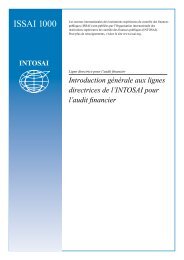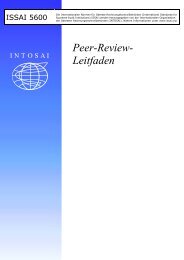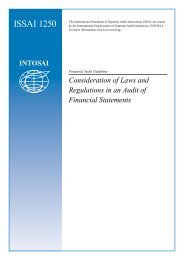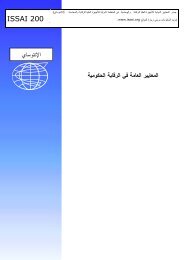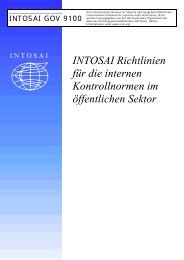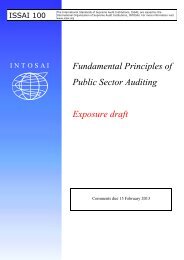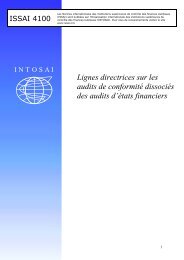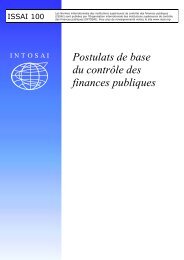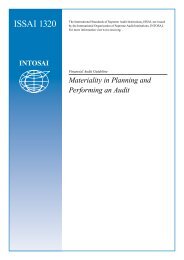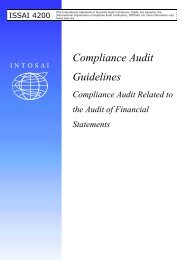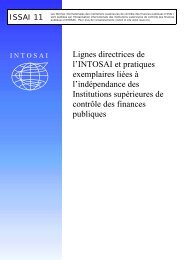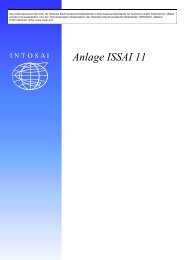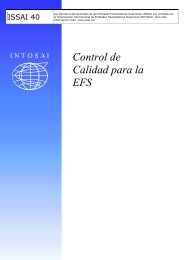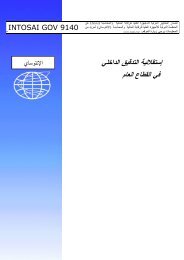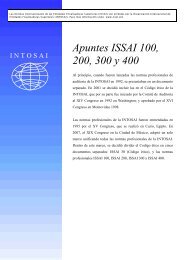ISSAI 1240
ISSAI 1240
ISSAI 1240
You also want an ePaper? Increase the reach of your titles
YUMPU automatically turns print PDFs into web optimized ePapers that Google loves.
<strong>ISSAI</strong> <strong>1240</strong><br />
ISA 240<br />
THE AUDITOR’S RESPONSIBILITIES RELATING TO<br />
FRAUD IN AN AUDIT OF FINANCIAL STATEMENTS<br />
• Assets, liabilities, revenues, or expenses based on significant estimates that<br />
involve subjective judgments or uncertainties that are difficult to corroborate.<br />
• Significant, unusual, or highly complex transactions, especially those close to<br />
period end that pose difficult “substance over form” questions.<br />
• Significant operations located or conducted across international borders in<br />
jurisdictions where differing business environments and cultures exist.<br />
• Use of business intermediaries for which there appears to be no clear business<br />
justification.<br />
• Significant bank accounts or subsidiary or branch operations in tax-haven<br />
jurisdictions for which there appears to be no clear business justification.<br />
The monitoring of management is not effective as a result of the following:<br />
• Domination of management by a single person or small group (in a non ownermanaged<br />
business) without compensating controls.<br />
• Oversight by those charged with governance over the financial reporting process<br />
and internal control is not effective.<br />
There is a complex or unstable organizational structure, as evidenced by the following:<br />
• Difficulty in determining the organization or individuals that have controlling<br />
interest in the entity.<br />
• Overly complex organizational structure involving unusual legal entities or<br />
managerial lines of authority.<br />
• High turnover of senior management, legal counsel, or those charged with<br />
governance.<br />
Internal control components are deficient as a result of the following:<br />
• Inadequate monitoring of controls, including automated controls and controls over<br />
interim financial reporting (where external reporting is required).<br />
• High turnover rates or employment of accounting, internal audit, or information<br />
technology staff that are not effective.<br />
• Accounting and information systems that are not effective, including situations<br />
involving significant deficiencies in internal control.<br />
Attitudes/Rationalizations<br />
• Communication, implementation, support, or enforcement of the entity’s values or<br />
ethical standards by management, or the communication of inappropriate values or<br />
ethical standards, that are not effective.<br />
• Nonfinancial management’s excessive participation in or preoccupation with the<br />
selection of accounting policies or the determination of significant estimates.<br />
36<br />
The Auditor’s Responsibilities Relating to Fraud in an Audit of Financial Statements 271



